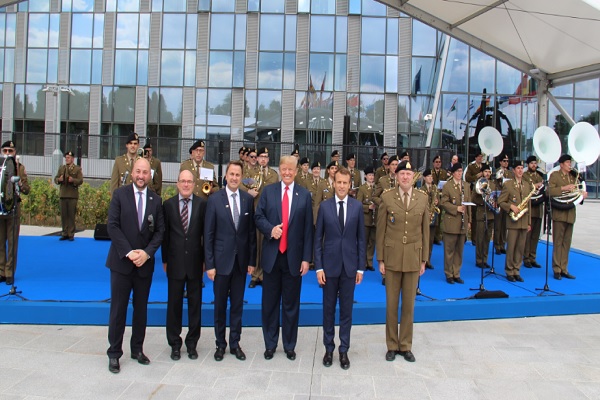 L-R: Étienne Schneider, André Reichling, Xavier Bettel, Donald Trump, Emmanuel Macron and General Alain Duschcène in front of the Military Music of the Luxembourg Army;
Credit: ME
L-R: Étienne Schneider, André Reichling, Xavier Bettel, Donald Trump, Emmanuel Macron and General Alain Duschcène in front of the Military Music of the Luxembourg Army;
Credit: ME
Luxembourg Prime Minister Xavier Bettel, Deputy Prime Minister and Minister of Defence Étienne Schneider and Minister of Foreign and European Affairs Jean Asselborn participated yesterday and today in the NATO Summit held in Brussels.
At the centre of the summit discussions, which brought together the heads of state and government, foreign ministers and defence ministers of the 29 members of the Alliance, included the issue of burden sharing, intensification of the fight against terrorism, the improvement of cyber defence and the current challenges for Euro-Atlantic security, including the question of Russia.
The strategic approach for the Middle East and North Africa, NATO's partnerships, as well as the adaptation and modernisation of the Alliance were also on the agenda. Finally, member countries discussed strengthening cooperation between NATO and the European Union.
The Luxembourg Prime Minister commented: "NATO is strong because it has been based since its creation in 1949 on unity and solidarity between North America and Europe in defence of our values and common interests and it is thanks to the Alliance that Luxembourg has lived more than 70 years of peace and prosperity. My country is aware of the need to invest in the security of our continent and Luxembourg will assume its share of responsibility in a spirit of burden-sharing solidarity."
Likewise, Étienne Schneider stated: "NATO plays a central role in the transatlantic partnership and in addressing the challenges in terms of external and internal security caused by a deteriorating international situation. In order for the Grand Duchy to maintain its reputation as a credible and reliable player at the international level, investments in defence policy will have to be pursued". He added that "security is much more than a defence case. When Luxembourg invests 1% in official development and humanitarian aid, this is also a contribution to security."
Similatly, Jean Asselborn argued that discussions within NATO "are not limited to an accounting-only approach", recalling the importance of development cooperation for Luxembourg, which improves the living conditions of people around the world and contributes to stability and security, as well as conflict prevention. Minister Asselborn finally underlined the importance for international peace and security for effective multilateralism and strengthening the international rule of law system.








